Yesterday SFX was at a select video-conference with Marvel Movies boss Kevin Feige, the creative driving force between the shared universe of it superheroes that has enabled Avengers Assemble to happen. Jayne Nelson was there for SFX , and here’s how the conversation went…
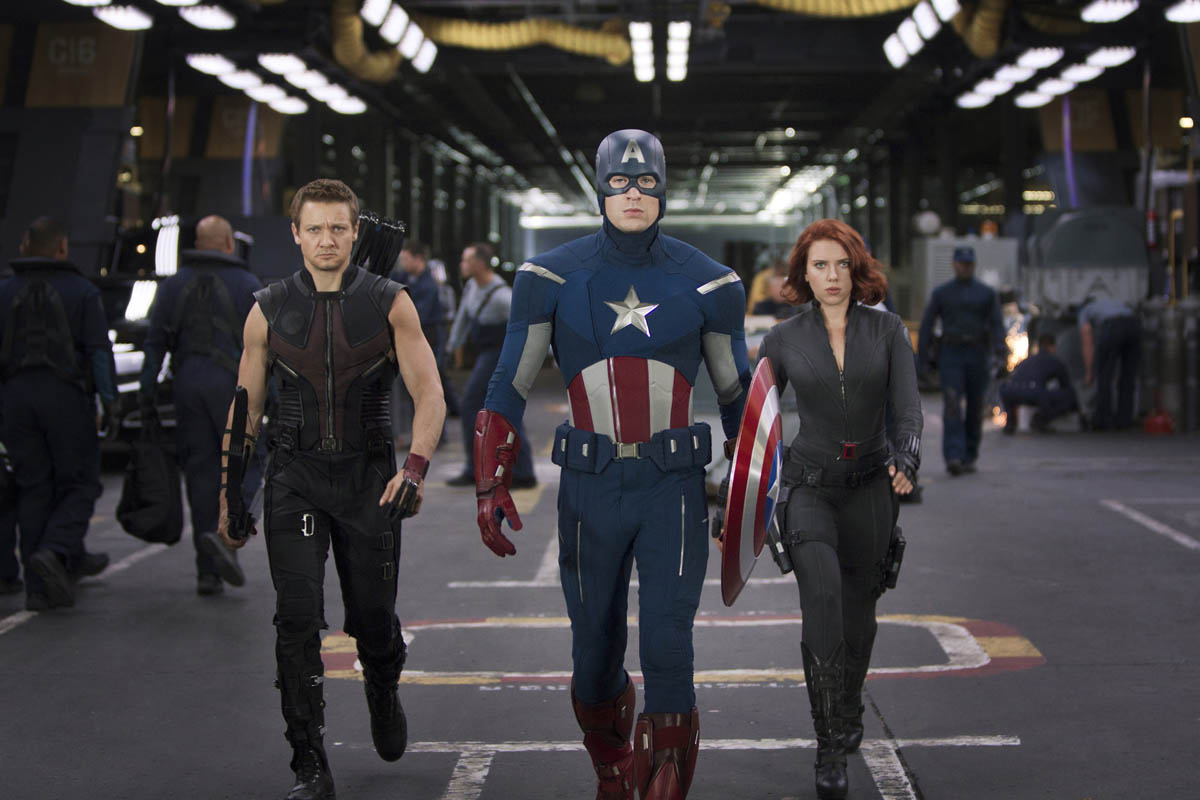
At what point during the production of the previous Marvel films did The Avengers seem like a viable idea?
Kevin Feige: “My recollection of it was it was either midway through the development of the script for Iron Man , or midway through the production for Iron Man – I don't remember which – but there was an epiphany that we had at one point. Our main goal... if you remember, we had become Marvel Studios then; we had gotten our own financing to do the movies ourselves, so we were essentially an independent film studio working on a movie that we knew had to compete with Spider-Man and X-Men and the best of the movies that we had done with our studio partners.
“So our only goal was ‘Make the best Iron Man movie we can.’ We had strong instincts about how to do that, and all we were working on was how to best bring Tony Stark to the masses.
“But there was a moment, during that process, when it dawned on me that we could use any of the other characters that we had in the Marvel universe. I had been working on Marvel movies for about five years before that, and whether it was on an X-Men movie or a Spider-Man movie or the development of a Fantastic Four movie, there was always at least one point where a screenwriter would ask, ‘Oh, can we use this person or that person or can we use SHIELD?’ And we were always saying, ‘Oh no you can’t, because this studio only has these characters, and that studio only has those characters, and we don't have the rights for that.’
“And when that question came up on Iron Man , I said... ‘Wait a minute, yes we can! We can use that! We have it all, it’s ours!’ And that’s how the character of Agent Coulson appeared very briefly in Iron Man , because we wanted somebody who was sniffing around: ‘What’s Tony Stark doing? What’s he working on?’ And because we already had that in the script, I thought, wouldn’t it be fun to do something that announces to the fans, to the world and to the movie-going public, that these films we’re doing are going to take place in the Marvel Universe? These films are going to take place in the universe where all of these heroes exist.
“But we didn’t want to take up any real screen time doing that. We didn’t want to confuse people who had no idea what the Marvel Universe was. We wanted to make a great Iron Man movie. Which is why you had to sit through seven minutes of end credits to see Sam Jackson walk in with an eyepatch and tell Tony Stark, ‘You’re part of a bigger universe; you just don’t know it yet.’
Sign up to the SFX Newsletter
Get sneak previews, exclusive competitions and details of special events each month!
“That was really the beginning of it, and the movie opened and did very well and people, whether they knew who Nick Fury was or not, loved the idea of ‘What’s Sam Jackson doing in an eyepatch at the end of this movie?’ People really seemed to gravitate towards this idea, and that’s when we sort of knew it was going to work and started laying out our master plan, our five year plan to Avengers .”
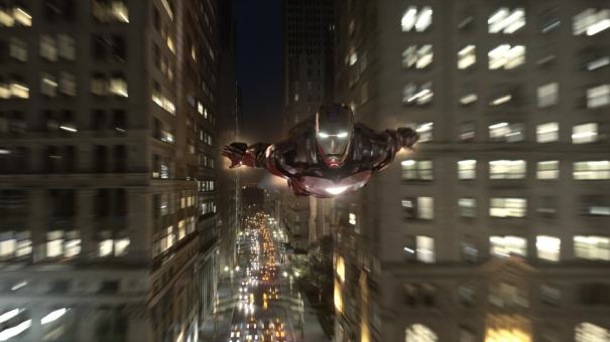
Was there any danger of The Avengers becoming “The Tony Stark Show”, as he is so popular?
“I think that easily could have happened, perhaps somewhere else, right? If you’re dealing with a traditional studio that’s just looking at, ‘Wait a minute, that’s the biggest movie and the biggest character, let’s do that.’ But that’s not what The Avengers is, right? The Avengers is not Iron Man 3 . That starts shooting in nine weeks. The Avengers is about those group of characters, so there is no real leader to The Avengers in the comic books. They each serve their own purpose and it was important enough to us to do that. So while Tony Stark is an amazing character and has a gigantic role in the movie, we did not want to make it just The Iron Man Show because that’s not what the comics are.
“We were betting that our plan was going to fall into place because we’d cast Chris Hemsworth as Thor and Tom Hiddleston as Loki in both movies before the first Thor came out! So we were betting on our own ability to make these movies and for the audience to respond to these characters in a way that would make them relevant when it came a year later to The Avengers film. Same with Chris Evans and Captain America . So we were very pleased and frankly breathed a sigh of relief when Thor worked, and when Captain America worked, and when people had embraced those characters and those actors because we were in too deep by that point. We weren’t turning back! So that was a sigh of relief.
“We’d even starting filming Avengers before those two films came out. It was nice that they came out during production and you could see Hemsworth and Hiddleston get very excited after their opening weekend, and Chris Evans was nervous for a while and then he breathed a sigh of relief and was very pleased! And Downey, of course, was pleased that his movie still did a little better than those other two.”
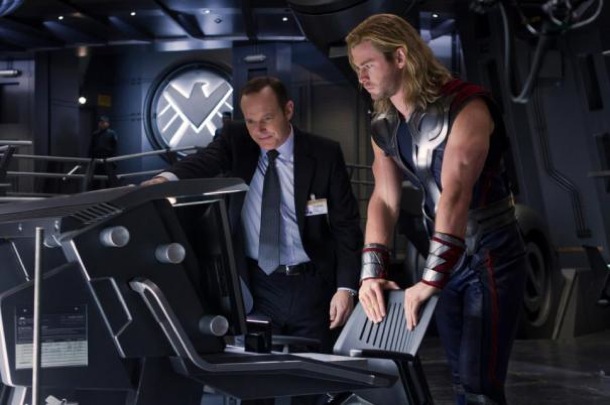
It’s tempting to see The Avengers as the culmination of all the other movies. How do you see it? Do you see it as everything building towards The Avengers or is The Avengers part of the building process, with Thor 2, Iron Man 3, etc to come?
“You know, everything we do, everything we’ve done over the years, is to try to emulate the experience of reading a comic. Of reading and experiencing and anticipating that Wednesday when a new comic is going to be released. And part of that are these events, these big crossover events that happen once a year or once every few years, where all the characters would come together for some universe-shaking thing. And then they would go back into their own books changed slightly from whatever that crossover event was. So ideally that’s the model that we’re gonna follow. So all these movies led up to The Avengers and The Avengers will be the jumping-off point for the next phase.
“I found myself calling Iron Man through to The Avengers ‘Marvel Cinematic Universe Phase One’ and now from Iron Man 3 up to, knocking wood, maybe Avengers 2 , ‘Phase Two’. Each of these big over-arching chapters of the Marvel Universe. So The Avengers is the culmination of what’s gone before and the jumping-off point of what’s to come.”
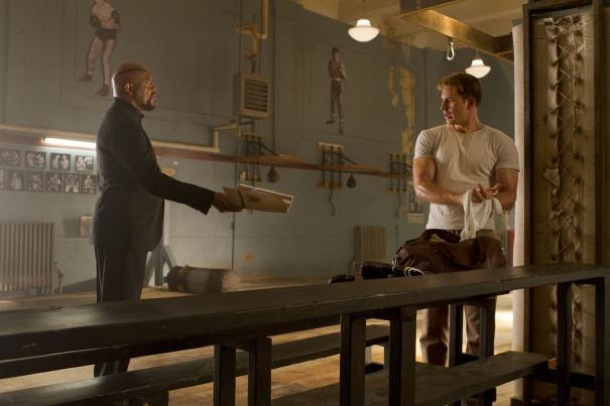
Will we see any teases towards something like Civil War ?
“I don't know if there would be an overt teaser for Civil War but you can obviously see that in the decades and decades of Avengers comics prior to the Civil War event, the conflict between the characters, the differences in worldviews of all the characters that led up to what happened in Civil War – certainly that’s in this movie. You can see how different Tony Stark and Steve Rogers are in a great way. In this movie the question is, are they going to be able to stop fighting each other long enough to fight the bad guy? Civil War would someday be a great crossover event, but here it’s more in the character interactions that you can see that stuff, than a direct easter egg or anything.”
Will the end of this movie have a teaser onto something else – and can you tell us anything?
“Well, as you can imagine, probably not!” [Laughter]
Can you hint? One presumes that it will lead into Iron Man 3 ...
“The minute we become predictable is when we become boring, right? So we’re avoiding becoming boring for as long as possible!”
Obviously everybody is crazy about Mad Men at the moment, and the Marvel Universe itself has strong ’60s connections. Does any of that nostalgia creep into the film?
“I don’t know that we did any sort of intentional homage to the ’60s in the same way Mad Men obviously does, but yes, our characters came from the crucible of the ’60s – the famous Marvel bullpen, led by Stan Lee and Jack Kirby. If you look at the comics, it was sort of a counterculture revolution occurring in the ’60s. Which then allowed Stan Lee to say, ‘What if these heroes were flawed and had the same kind of problems we do, and don’t just spend their time fighting a creature from the ocean, but do that and then they have to deal with their home issues, family issues or social issues.’ That was the genius of the Marvel universe back then. All of that informs all of our movies, the way we present characters on the big screen now.
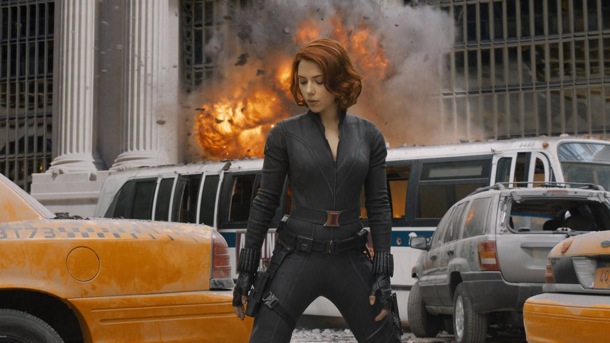
“Talking about Scarlett Johansson as Black Widow, she had her roots in the Cold War and in the ’60s spy era. Scarlett’s a young woman – you do the math – she was not fighting anybody in the Cold War! But there are references to her past, her spy past, and her Russian heritage in this movie. Joss Whedon has made his name making some of the best female characters in genre TV shows and films. It was very important to him that the one female Avenger in the movie has a really big role to play. People who’ve seen the movie early on [say] she’s one of the standouts. She just had a small role in Iron Man 2 and you saw her costume for the first time and her abilities briefly for the first time. In this film you see much more of her character and she’s done a terrific job, not just with her stunts but with her performance. She’s got two of the best scenes in the movie – one’s an action scene and one’s a dialogue scene with her and another character, and it’s amazing! Scarlett of course gets the credit for that, but Joss gave her a great script and directed her to a great performance.”
More of this interview on the next page
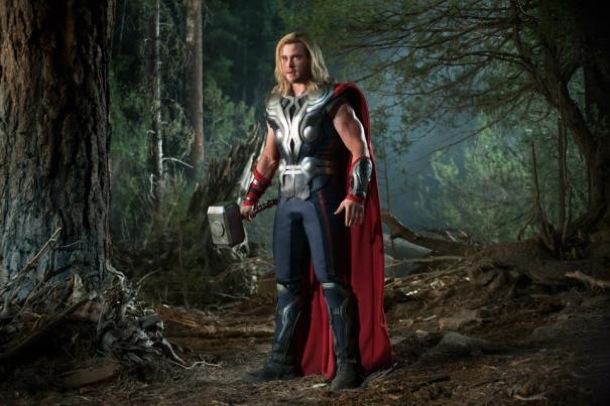
Will we be seeing the Avengers struggling through personal issues?
“They all do! All of them have problems, that’s what’s fun about them. Tony Stark is a great example – a man who’s selling weapons to the highest bidder and not thinking about the moral complications that came along with that, until one of his own weapons blew up in his face and started that redemption story. He’s always struggling between his own ego and his own personality and doing the right thing. Bruce Banner, of course, is always struggling with the creature inside him and losing his temper, and even Thor – who on the surface is literally a god from another planet, and would seemingly be the most unrelatable character – is full of flaws, and is a big pompous ass in the first half of his own movie! His father’s yelling at him and kicking him out of the house and dealing with his issues with his brother. And in this movie he’s got big family issues going on. The main bad guy in the movie is his brother! That’s what tears them apart. So all of them need to have those kind of flaws, these kind of relatable problems. That’s what makes them Marvel characters.”
How is the 3D being converted and how much was Joss Whedon involved in it?
“He was involved, and Seamus McGarvey, our DP, in every step of the process. Every shot was framed and designed to be able to accentuate the 3D process. Joss and Seamus did a test early on with 2D cameras and 3D cameras – we said, ‘Whatever you want to do, you can shoot it in 3D or you can shoot it in 2D and we can convert it.’ And they chose to shoot it in 2D, believing it gave them more freedom of camera; it gave them a better, more creative time on set.
“And all of the tests that we've done, going back to Captain America , where we gave the same choice to Joe Johnston and Shelly Johnson, his DP, also chose 2D to convert. If you have the time and the right technicians, there’s very little noticeable difference between them. If you just shoot your whole movie, cut it together, finish it and then go, ‘Hey, you know what? Let’s make it 3D!’ it’s not going to work. Just like if you shoot your movie, cut it together and go, ‘You know what? Let’s add another giant action scene with a lot of CG in seven days!’ That’s not gonna work. But if you plan it, and you have the time and the right technicians, we believe there’s no difference.
“And Avengers has had the most time, and the best technicians, and in Joss a director who is embracing 3D in a giant way, and who wants these characters to come out into the audience. And we’re almost finished with that now and it looks amazing and Joss and Seamus are there every day.”
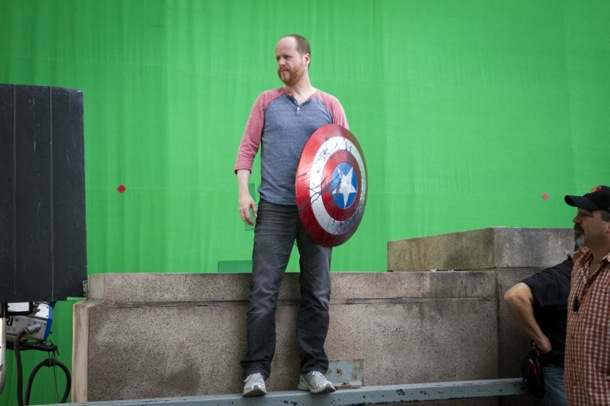
Whedon is still relatively inexperienced at directing feature films. Did you feel there was a risk bringing him on as director?
“If you look at the kind of people we’ve brought on as directors on our movies, experience in handling giant effects and giant production is not the first thing we look for on their resumé. We know how to do that, we’ve been doing it a long time now, and we believe we know the best artists and technical folk that we can put around the filmmakers to really give them that solid foundation. But we want storytellers; we want people that can bring something new and fresh to these kinds of movies, and certainly with Joss being a writer/director, that’s what we wanted.”
Was it always the case that he was going to write and direct?
“Always to write/direct.”
The New York Times called you “ one of the most powerful people in movies ”...
“What? When did that happen? Wow!”
You're also a giant comic-book geek – so how does that feel, being a geek with so much power?
“You can see the glamorous surroundings of this powerful person!” [Indicates the poky room he’s sitting in] “No, you know what? Marvel is a unique place, and we keep our heads down, and we just want to make the best movies that we can. And there’s not a lot of Hollywood antics that we do and we’re quite frugal when it comes to the way that we try to produce these movies, because the more frugal you are, the more likely it is for the film to become profitable and the more likely it is that somebody will give you more money to make another movie.
“So it is funny to read those kind of things, because we do just feel like a group of comic nerds and movie nerds who sit in offices that look like this and say, ‘You know what would be cool? If we brought all these characters together and put them in one movie!’ ‘It’s impossible! You can’t do it! You’ll never get any actors, they’ll cost too much!’ ‘Oh, let’s try...’ And that’s the same way we’re acting now as we start the production of Iron Man 3 in a few weeks, the same way we’re acting about the next Thor film, which goes into production at the end of the summer. You know, the minute we start saying, ‘Look what The New York Times called me!’ movies are going downhill. We’ll avoid that as long as we can!”
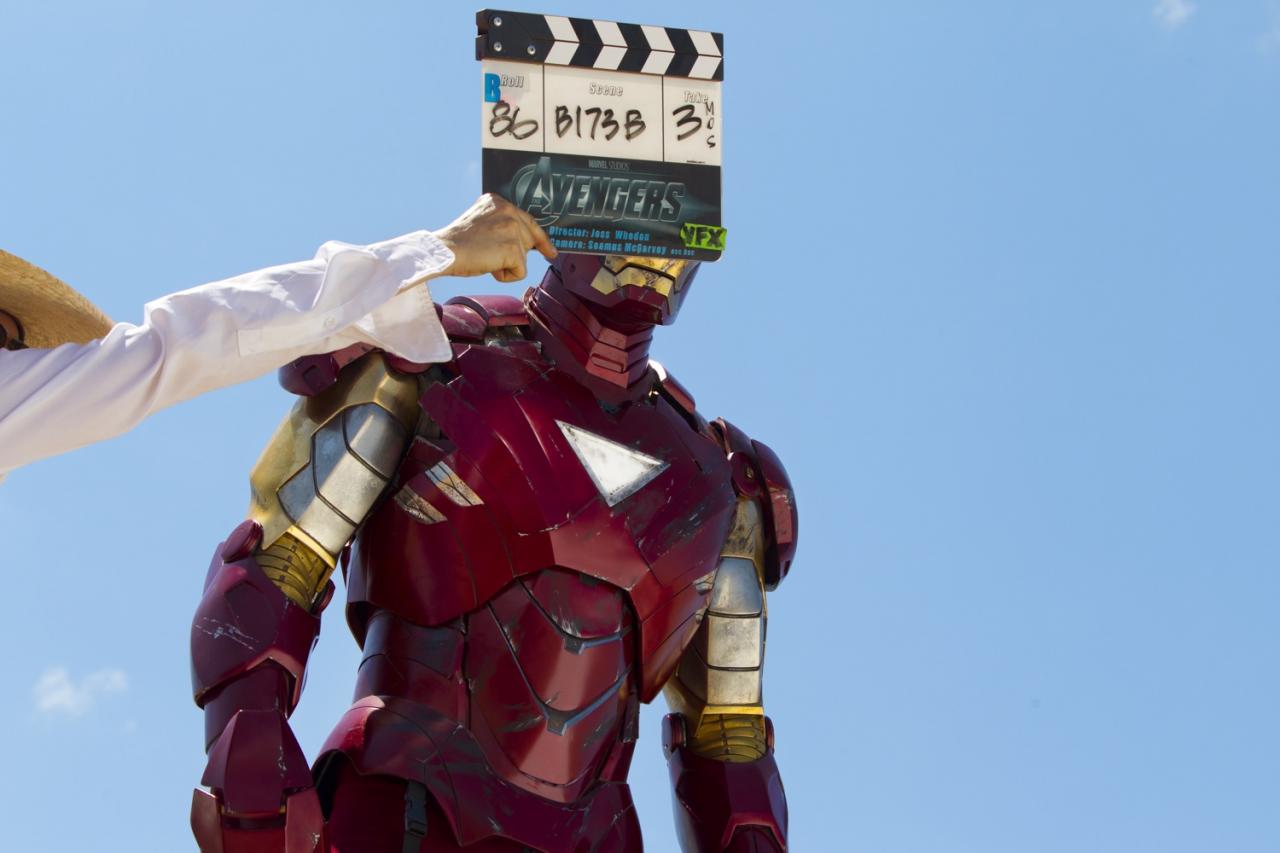
Can you tell us anything about Edgar Wright and Joe Cornish’s Ant-Man ? Is it anywhere?
“It is somewhere. I’ll just say it’s closer than it’s ever been in its long, maybe eight-year history, and I usually email Edgar every two or three days and over those eight years it’s been further away and closer… Just like the planets'’ orbits coming closer or further, we are now closer than we’ve ever been. So I hope it will come together shortly.”
Watch the latest Avengers Assemble trailer
SFX Magazine is the world's number one sci-fi, fantasy, and horror magazine published by Future PLC. Established in 1995, SFX Magazine prides itself on writing for its fans, welcoming geeks, collectors, and aficionados into its readership for over 25 years. Covering films, TV shows, books, comics, games, merch, and more, SFX Magazine is published every month. If you love it, chances are we do too and you'll find it in SFX.


